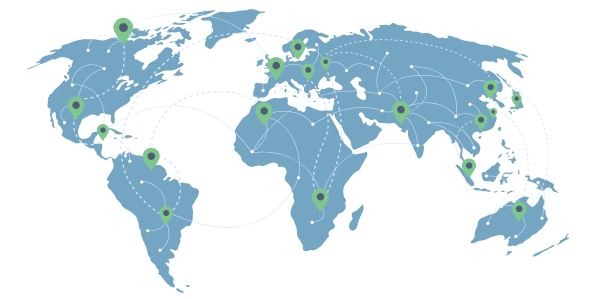How to Choose the Best VPN Server
Using a VPN service is fairly straightforward. However, even experienced VPN users often face the challenge of finding and connecting to the right server. While the nearest universal server may offer good speeds, a remote, optimized server can provide better conditions for your specific use case.
In this article, we’ll explain how to choose the right server if you want to play online games without interruptions, access geo-blocked content, or simply maximize your privacy.
Why VPN Server Location Matters
No matter what you do online, your server’s location will impact your overall internet experience. It affects your upload and download speeds, latency, security, privacy, and the range of content you can access with a VPN.
For a smooth, reliable, and convenient online experience, server location is the first thing to consider when using a VPN. Here’s how to choose the right server location for your specific needs.
The Best VPN Location for Fast and Reliable Connections
If speed and reliability are your top priorities, it’s best to connect to the nearest server. This way, data packets from your device reach the VPN server and the desired website faster, and the response returns to your device more quickly.
A nearby server will provide a fast connection that won’t drop during use. However, there are a few factors to consider before connecting to the closest server:
- The country’s digital infrastructure affects internet speed and VPN performance. Regions with better connectivity and modern network equipment usually offer higher speeds and more reliable connections.
- The number of VPN servers in the country can also impact VPN performance. If servers are always overloaded, you may experience slow speeds, packet loss, jitter, and increased latency.
- Some VPN services display server ping or load. Use these indicators to choose a server with the lowest ping or load for the best speeds.
The Best VPN Server Location for Accessing Geo-Blocked Content
In some countries, access to popular websites and social networks is blocked. Additionally, services like YouTube or Netflix use your IP address to provide content available only in your region, often due to licensing or copyright laws.
To bypass local restrictions or access content from another region’s library, you need an IP address from the desired location. A VPN allows you to do this by masking your real IP address and assigning a new one based on the server you connect to.
Note that some streaming services block users who use VPNs.
The Best VPN Server Location for Privacy and Security
VPN services enhance your privacy regardless of the server you choose. They offer strong encryption, data leak protection, a kill switch, and a strict no-logs policy, so no one can access your data or information about you.
Some VPN providers use RAM-only servers, which store data only while you’re connected. All data is wiped at the end of your session or when the server is rebooted.
However, in some countries, VPN services are required to monitor, log, or collect user data and provide it to authorities upon request. For maximum privacy, choose a VPN server based in a country with strict data protection laws, such as Iceland or the British Virgin Islands.
For example, countries in the intelligence-sharing alliances known as the “Five Eyes,” “Nine Eyes,” and “Fourteen Eyes” share information about their citizens. Here are the member countries:
- Five Eyes Alliance: Australia, Canada, New Zealand, the United States, and the United Kingdom.
- Nine Eyes Alliance: France, Denmark, Norway, the Netherlands, plus the Five Eyes countries.
- Fourteen Eyes Alliance: Belgium, Germany, Sweden, Spain, Italy, plus the Nine Eyes countries.
Member states have attempted to introduce backdoors into software, which could compromise your security and privacy. That’s why many security experts recommend VPN services headquartered outside these alliances.
However, a VPN operating in these countries can still protect your data. For example, some VPN providers are based in the U.S. but have a strict no-logs policy. Still, there’s no guarantee that VPNs in other regions won’t track your online activity. Some countries have anti-privacy regulations requiring VPN providers to log user data. Always choose services that protect user privacy.
How to Choose the Best VPN Server Location
The right server location depends on your personal preferences and online needs. If your goal is a fast and reliable connection, choose a server close to your physical location.
To bypass censorship or unlock geo-restricted content, connect to a server where that content is available. This applies to both free websites and subscription-based services. If data protection is your main concern, select a server in a country with strict data privacy laws.
The best VPN services are usually based in countries like Panama, Switzerland, Iceland, Romania, and the British Virgin Islands. These countries have strict laws that protect user privacy and prohibit companies from collecting or processing user data.



